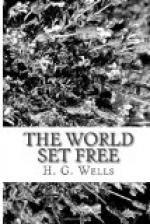Their five pairs of feet stuck out with a curious stiff unanimity....
‘What else was there to do?’ he said in answer to some internal protest.
‘I wonder, Firmin, if there are any more of them?’
‘Bombs, sir?’ asked Firmin.
’No, such kings....
‘The pitiful folly of it!’ said the ex-king, following his thoughts. ‘Firmin,’ as an ex-professor of International Politics, I think it falls to you to bury them. There? . . . No, don’t put them near the well. People will have to drink from that well. Bury them over there, some way off in the field.’
CHAPTER THE FOURTH
THE NEW PHASE
Section 1
The task that lay before the Assembly of Brissago, viewed as we may view it now from the clarifying standpoint of things accomplished, was in its broad issues a simple one. Essentially it was to place social organisation upon the new footing that the swift, accelerated advance of human knowledge had rendered necessary. The council was gathered together with the haste of a salvage expedition, and it was confronted with wreckage; but the wreckage was irreparable wreckage, and the only possibilities of the case were either the relapse of mankind to the agricultural barbarism from which it had emerged so painfully or the acceptance of achieved science as the basis of a new social order. The old tendencies of human nature, suspicion, jealousy, particularism, and belligerency, were incompatible with the monstrous destructive power of the new appliances the inhuman logic of science had produced. The equilibrium could be restored only by civilisation destroying itself down to a level at which modern apparatus could no longer be produced, or by human nature adapting itself in its institutions to the new conditions. It was for the latter alternative that the assembly existed.
Sooner or later this choice would have confronted mankind. The sudden development of atomic science did but precipitate and render rapid and dramatic a clash between the new and the customary that had been gathering since ever the first flint was chipped or the first fire built together. From the day when man contrived himself a tool and suffered another male to draw near him, he ceased to be altogether a thing of instinct and untroubled convictions. From that day forth a widening breach can be traced between his egotistical passions and the social need. Slowly he adapted himself to the life of the homestead, and his passionate impulses widened out to the demands of the clan and the tribe. But widen though his impulses might, the latent hunter and wanderer and wonderer in his imagination outstripped their development. He was never quite subdued to the soil nor quite tamed to the home. Everywhere it needed teaching and the priest to keep him within the bounds of the plough-life and the beast-tending. Slowly a vast system of traditional imperatives superposed itself upon his instincts, imperatives that were admirably fitted to make him that cultivator, that cattle-mincer, who was for twice ten thousand years the normal man.




